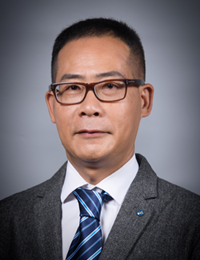
ZHANG XinYuProfessor

ZHANG XinYu
Professor
Email: xyzhang999@shsmu.edu.cn
Tel: +86 21 63846590
Research Areas: Metabolism, environmental pollutants, bilirubin degradation
Biography
Professor Xin-Yu Zhang received his bachelor’s degree from Peking University in 1987, and continued to earn his PhD in organic chemistry at Peking University in 1993. He then pursued his postdoctoral training in physical organic chemistry at the Shanghai Institute of Organic Chemistry, Chinese Academy of Sciences, in the laboratory of Academician Xi-Kui Jiang (1993-1996), and also in biochemistry at the Weizmann Institute of Science, Israel, in the laboratory of Professor Mordechai Sheves (1996-1998). After that he went to University of Wisconsin-Madison, the United States of America, working in the Department of Biochemistry (with Professor Paul W. Ludden) and the Department of Comparative Biosciences (with Professor Adnan A. Elfarra) as a research associate until 2006. Subsequently he moved to Massachusetts and worked in the Department of Chemistry of Amherst College as a research associate for another two years. In the summer of 2008, he returned to China and joined the Institute of Environmental Pollution and Health, Shanghai University, as a faculty member. In 2017, he joined the School of Public Health, Shanghai Jiao Tong University School of Medicine as a professor.
Dr. Zhang is a chemist by training but has diverse research experience in biochemistry, toxicology, and environmental sciences. Specifically, he has research experience in proteins (rhodopsin, nitrogenase, protein tyrosine phosphatases, and myeloperoxidase), biomolecules (heme and bilirubin), environmental pollutants (1,3-butadiene and persistent organic pollutants), photochromism and fluorescence probes, hydrophobicity, reaction mechanisms, and neutrophils.
Currently, Dr. Zhang works at the interfaces among chemistry, toxicology, and biomedicine. His research interests include the metabolism, genotoxicity and mutagenicity, DNA adducts, myeloperoxidase, neutrophils, and inflammation. The ongoing projects include the studies on environmental pollutants (in particular, alkenes such as 1,3-butadiene), natural products (the active ingredients in traditional Chinese medicine), and bilirubin. He is investigating in the metabolism of these compounds, DNA adducts and biomarkers of the metabolites, oxidative degradation of bilirubin, and how these processes are involved in inflammation.
Dr. Zhang has membership in several professional societies, including Chinese Society of Toxicology, Chinese Society for Environmental Sciences, and Chinese Pharmacological Society. He is an Editorial Board member of Toxicology and Applied Pharmacology.
Publications
Wan-Qi Chen and Xin-Yu Zhang*. 1,3-Butadiene: a ubiquitous environmental mutagen and its associations with diseases. Genes and Environment 2022, 44, 3.
Jingjing Wan, Ruixue Chen, Zhou Yang, Jing Xi, Yiyi Cao, Yu Chen, Xinyu Zhang*, Yang Luan*. Aristolochic acid IVa forms DNA adducts in vitro but is non-genotoxic in vivo. Archives of Toxicology 2021, 95(8), 2839-2850.
Wen-Jing Wu, Wei-Feng Tang, Ming-Hui Xiang*, Jianshe Yan, Xiumei Cao, Chang-Hui Zhou, Yan Chang, Jing Xi, Yi-Yi Cao, Yang Luan, Xin-Yu Zhang*, Isotope dilution LC/ESI--MS-MS quantitation of urinary 1,4-bis(N-acetyl-S-cysteinyl)-2-butanone in mice and rats as the biomarker of 1-chloro-2-hydroxy-3-butene, an in vitro metabolite of 1,3-butadiene. Chemico-Biological Interactions 2019, 311, 108760.
Hao Xu, Chao Feng, Yiyi Cao, Ying Lu, Jing Xi, Jieyun Ji, Dasheng Lu*, Xin-Yu Zhang*, Yang Luan, Distribution of the parent compound and its metabolites in serum, urine, and feces of mice administered 2,2,4,4-tetrabromodiphenyl ether. Chemosphere 2019, 225, 217-225.
Xin-Yu Zhang*, Adnan A Elfarra*, Myeloperoxidase-mediated bioactivation of olefins. In Advances in Molecular Toxicology, Vol. 12 (J. C. Fishbein and J. M. Heilman Eds.) Chapter 4, Academic Press, Cambridge, USA, 2018, pp. 123-150.
Xin-Yu Zhang, Adnan A Elfarra*, Toxicity mechanism-based prodrugs: glutathione-dependent bioactivation as a strategy for anticancer prodrug design. Expert Opinion on Drug Discovery 2018, 13, 815-824.
Ye Wang, Ying-Xin Yu, Yang Luan, Jing An, Dong-Guang Yin, Xin-Yu Zhang*, Bioactivation of 1-chloro-2-hydroxy-3-butene, an in vitro metabolite of 1,3-butadiene, by rat liver microsomes. Chemico-Biological Interactions 2018, 282, 36-44.
Ling-Yan Liu, Jin Zheng, Cong Kong, Jing An, Ying-Xin Yu, Xin-Yu Zhang*, Adnan A. Elfarra*, Characterization of the major purine and pyrimidine adducts formed after incubations of 1-chloro-3-buten-2-one with single-/double-stranded DNA and human cells. Chemical Research in Toxicology 2017, 30, 552-563.
Fang-Mao Zeng, Ling-Yan Liu, Jin Zheng, Cong Kong, Jing An, Ying-Xin Yu, Xin-Yu Zhang*, Adnan A. Elfarra*, Identification of a fused-ring 2-deoxyadenosine adduct formed in human cells incubated with 1-chloro-3-buten-2-one, a potential reactive metabolite of 1,3-butadiene. Chemical Research in Toxicology 2016, 29, 1041-1050.
Jin Zheng, Yan Li, Ying-Xin Yu, Jing An, Xin-Yu Zhang*, Adnan A. Elfarra*, Novel adducts from the reaction of 1-chloro-3-buten-2-one with 2-deoxyguanosine. Structural characterization and potential as tools to investigate 1,3-butadiene carcinogenicity. Chemico-Biological Interactions 2015, 226, 40-48.
Ying Wen, Keyin Liu, Huiran Yang, Yi Li, Haichuang Lan, Xinyu Zhang*, Tao Yi*, A highly sensitive ratiometric fluorescent probe for the detection of cytoplasmic and nuclear hydrogen peroxide. Analytical Chemistry 2014, 86, 9970-9976.
Liang Sun, Avishay Pelah, Dong-Ping Zhang, Yu-Fang Zhong, Jing An, Ying-Xin Yu, Xin-Yu Zhang*, Adnan A. Elfarra*, Formation of fused-ring 2-deoxycytidine adducts from 1-chloro-3-buten-2-one, an in vitro 1,3-butadiene metabolite, under in vitro physiological conditions. Chemical Research in Toxicology 2013, 26, 1545-1553.
Xin-Jie Liu, Fang-Mao Zeng, Jing An, Ying-Xin Yu, Xin-Yu Zhang*, Adnan A. Elfarra*, Cytotoxicity, genotoxicity, and mutagenicity of 1-chloro-2-hydroxy-3-butene and 1-chloro-3-buten-2-one, two alternative metabolites of 1,3-butadiene. Toxicology and Applied Pharmacology 2013, 271, 13-19.
Pan-Pan Zhang, Ying Wen, Jing An, Ying-Xin Yu*, Ming-Hong Wu, Xin-Yu Zhang*, DNA damage induced by three major metabolites of 1,3-butadiene in human hepatocyte L02 cells. Mutation Research 2012, 747, 240-245.
Ying-Xin Yu, Yu-Ping Pang, Chen Li, Jun-Ling Li, Xin-Yu Zhang*, Zhi-Qiang Yu, Jia-Liang Feng, Ming-Hong Wu, Guo-Ying Sheng, Jia-Mo Fu, Concentrations and seasonal variations of polybrominated diphenyl ethers (PBDEs) in in- and out-house dust and human daily intake via dust ingestion corrected with bioaccessibility of PBDEs. Environment International 2012, 42, 124-131.
Ying Wen, Pan-Pan Zhang, Jing An, Ying-Xin Yu, Ming-Hong Wu, Guo-Ying Sheng, Jia-Mo Fu, Xin-Yu Zhang*, Diepoxybutane induces the formation of DNA-DNA rather than DNA-protein cross-links, and single-strand breaks and alkali-labile sites in human hepatocyte L02 cells. Mutation Research 2011, 716, 84-91.




